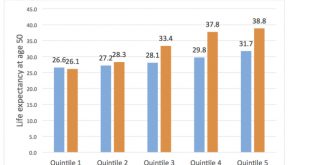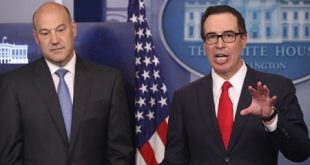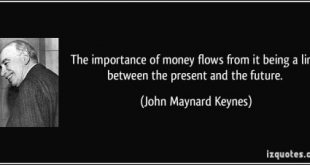from Peter Radford Simplification, in the context of an economy, is the eradication of all things of interest. This does not mean that studying an economy is thus doomed to be a pointless recitation of history as it unfolds. It is, rather, the recognition that as an economy moves through time it is never, to paraphrase Heraclitus, possible to see the same thing twice. Each economy is different. Each instance of the same economy is different. Any attempt to generalize eradicates those...
Read More »Economics is a form of brain damage
from Asad Zaman Environmentalist David Suzuki hits the nail on the head. The number of ways that economic theory systematically blinds you to the realities of the world we live in is almost uncountable. When Henry George’s land tax became widely popular, economists “disappeared” land as a factor of production from economic theories, merging it illegitimately with capital. Money is made to “disappear” by using the quantity theory of money to claim that money is veil. This makes it...
Read More »The benefits of free trade — a fallacy based on a fantasy
from Lars Syll Plenty of people will try to convince you that globalization and free trade could benefit everyone, if only the gains were more fairly shared … This belief is shared by almost all politicians … and it’s an article of faith for the economics profession. You are right to reject it … It’s a fallacy based on a fantasy, and it has been ever since David Ricardo dreamed up the idea of “Comparative Advantage and the Gains from Trade” two centuries ago. The best way to prove that...
Read More »How’s the Eurozone doing?
On 6 April, Mario Draghi made a speech titled ‘Monetary policy and the economic recovery in the Euro Area’. I would have emphasized the existing disequilibria a little more: unemployment in Germany is not far away from ‘low’ but this comes at the cost of an 8% of GDP surplus of the current account. German domestic demand (investments, public and private consumption) is i.e. about 10% too low to guarantee low unemployment. See also this recent Eurostat press release, which shows that,...
Read More »America’s hidden pains
from William Neil We begin with some gross numbers from Das’ Age of Stagnation: the loss of wealth from the Great Recession of 2008-2009. Citing the work of three economists at the Federal Reserve Bank of Dallas (Tyler Atkinson, David Luttrell and Harvey Rosenblum), the figures they put on the loss to the U.S. economy come to 6-14 trillion dollars, “equivalent to U.S. $50,000 to U.S. $120,000 for every American household, or 40-90% of one year’s economic output”. We’ve seen figures of...
Read More »Mind the growing retirement gap
from David Ruccio I find myself thinking more these days about the fairness of Social Security and other government retirement benefits. One reason, of course, is because I’m getting close to retirement age—and, as I discover each time I raise the issue with students, young people don’t think about it much.* Another reason is because Social Security (in addition to Medicare, Disability, and other programs) is the way the United States creates a collective bond between current and former...
Read More »Trump Unveils Outline of his Pro-Corporate Tax Plan
Trump would be one of the main beneficiaries of his own tax reform proposal, benefitting from the lowering of "pass-through" income, says CEPR's Dean Baker Visit http://therealnews.com for more stories and help support our work by donating at http://therealnews.com/donate.
Read More »The market paradigm versus the production paradigm
from Robert Wade Why have the large majority of professional economists, especially in the academy and in western-dominated international organizations like the World Bank and IMF, been committed to free trade policy, downplaying theoretical and empirical weaknesses in order to remain so? The teaching of economics in just about all universities of the western world, and in large parts of the developing world, socializes students into belief in the rightness of the “market” paradigm, and...
Read More »Keynes on ‘money neutrality’ and the ‘classical dichotomy’
from Lars Syll Paul Krugman has repeatedly over the years argued that we should continue to use neoclassical hobby horses like IS-LM and AS-AD models. Here’s one example: So why do AS-AD? … We do want, somewhere along the way, to get across the notion of the self-correcting economy, the notion that in the long run, we may all be dead, but that we also have a tendency to return to full employment via price flexibility. Or to put it differently, you do want somehow to make clear the...
Read More »Trump is repeating exactly the same script that has guided neoliberal policy for over three decades.
from Jim Stanford However it is explained in economic theory, the fundamentally productive, entrepreneurial role of capitalist investment is essential to the political and social legitimacy of the elites who lead the system – and who own and profit from the bulk of its wealth. Indeed, the thriftiness of the early capitalists, and their willingness to plough their savings back into growth, accumulation, and innovation, is precisely what endeared this dynamic new class to the classical...
Read More » Real-World Economics Review
Real-World Economics Review





